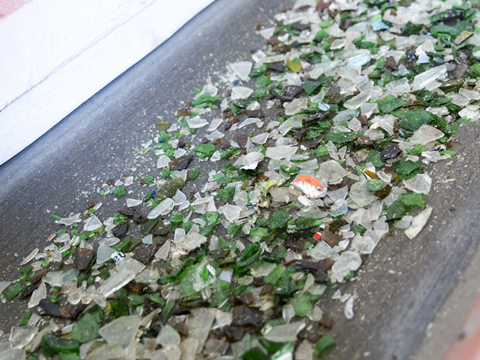
Maybelline New York, L’Oréal Groupe, Kraft Heinz, P&G, and Target have contributed to a Closed Loop Partners report laying out a roadmap to recovering small-format packaging materials from materials recovery facilities (MRFs) and glass recycling plants.
Currently, most small-format plastic packaging ends up in landfills or incinerators. Where it does enter a recycling facility, its size makes it susceptible to slipping through sorting equipment, contaminating the glass stream, and being sent to landfills anyway.
Conducted by Closed Loop Partners’ Center for the Circular Economy, the report brings together over two years of market research and recycling tests. In collaboration with Circular Services and its twenty MRFs across the United States, the Center collected samples from two MRFs’ glass streams and one glass recycling plant’s residue streams to evaluate their contamination.
It also trialled different equipment configurations in search of ways to sort plastics out of these streams, and sent samples to reclaimers to test their processability and market value, repeating the process several times.
According to its findings, many small-format plastic materials have ‘significant’ market value; market demand for such materials is believed to be strong, especially from mechanical recyclers. Moreover, logistical solutions already exist to handle such materials, and current technologies can be adapted to recover portions of them at MRFs and glass recycling plants.
The Center emphasizes that targeted investment at recycling facilities is ‘essential to build a compelling, scalable business case to recover smaller materials’.
In its view, ‘tens of thousands of tons’ of plastics could be recovered every year by applying its findings to recycling facilities across the U.S. Materials once considered contaminants and discarded from glass recycling plants can apparently be sorted and directed into appropriate bales for sale on the recycled materials market – an outcome set to unlock economic and environmental benefits.
This is also hoped to help market players meet their waste reduction goals and comply with Extended Producer Responsibility legislation.
‘Significant volumes’ of materials can reportedly be saved by upgrading and reconfiguring existing equipment. Updating the glass screen at an MRF was said to lead to a 67% relative reduction in mid-to-large-sized ‘small’ plastics contaminating the glass stream, for instance.
Envisioning this as a next step, the Center anticipates a ‘quantifiable tonnage’ of materials diverted from landfill, as well as lower carbon emissions and an increase in post-consumer recycled content.
“We’re eager to put our findings to the test and, through the Consortium to Recover Small-Format Packaging, deploy equipment and infrastructure upgrades to drive real-world proof-of-concepts in the field,” said Kate Daly, managing partner at Closed Loop Partners’ Center for the Circular Economy. “It’s critical that we advance solutions to recover valuable small-format materials, like polypropylene, that otherwise typically end up in landfill.
“This is inherently a cross-industry challenge, as small-format packaging is used in beauty, pharmacy, foodservice, beverage, retail and beyond. We’re inviting our research-phase partners and brands across various sectors to join the Consortium and help address an urgent waste challenge.”
Marissa Pagnani McGowan, chief sustainability officer, North America for L’Oréal Groupe, commented: “L’Oréal is excited to partner with Closed Loop Partners to develop innovative solutions for recovering packaging materials, reducing waste and creating opportunities in a fragmented national recycling infrastructure.
“Closed Loop Partners’ Center for the Circular Economy provides practical and scalable approaches for recovering small-format plastics that end up in landfills. We believe scaling these innovations will improve the recyclability of plastic and create a viable end-market for our materials.”
Trisha Ayyagari, global brand president of Maybelline New York, continued: “As the number one makeup brand in the world, we have a responsibility to create the most sustainable makeup life cycle possible. Most makeup packaging is too small to be recycled, it literally falls through the cracks at recycling facilities.
“That’s why it was so important to partner with Closed Loop Partners’ Center for Circular Economy to pioneer solutions for small-format recycling and to help us and the beauty industry accelerate our sustainable transformation. We look forward to making progress together.”
“At Kraft Heinz, we know collaboration is the key to unlocking solutions for the future of packaging,” added Linda Roman, director of Packaging R&D and North America R&D Fellow at Kraft Heinz. “We are proud to partner with Closed Loop Partners on this groundbreaking research to advance packaging solutions, improve end-of-life recovery and enhance critical infrastructure.
“By working together, we can drive meaningful change and create a more sustainable future for food.”
Manufacturers, brand owners, and other stakeholders in the small-format packaging value chain are encouraged to join Center’s Consortium to Recover Small-Format Packaging, an industry collaboration seeking to drive a team effort towards recycling infrastructure investments and policy for recovery across the United States. Interested parties are encouraged to contact the Center for the Circular Economy to learn more.
In similar news, VTT is licensing its mixed plastic recycling technology to Refinity, a new subsidiary of Innventure Inc. It plans to scale up and utilize waste recovery technologies to convert even poor-quality plastic waste into high-quality recyclate suitable for use in the pharmaceutical and food industries.
Meanwhile, at another MRF in Newry, Re-Gen is counting the individual items of packaging among the annual 250,000 tonnes of mixed household waste with Polytag’s watermarking technology.
Another Closed Loop Partners project involved a collaboration with The Coca-Cola Company, PepsiCo, Starbucks, and other big brands to test reusable cups as default takeaway packaging across restaurants in Petaluma, California. The move was hoped to replace ‘hundreds of thousands’ of single-use cups and create return habits among consumers, a ‘key factor’ in establishing successful reuse schemes.
If you liked this story, you might also enjoy:
Reuse vs. single use – which is better for the environment?
Sustainable Innovation Report 2025: Current trends and future priorities
What can the world learn from South Korea’s world-leading performance in plastics circularity?














No comments yet